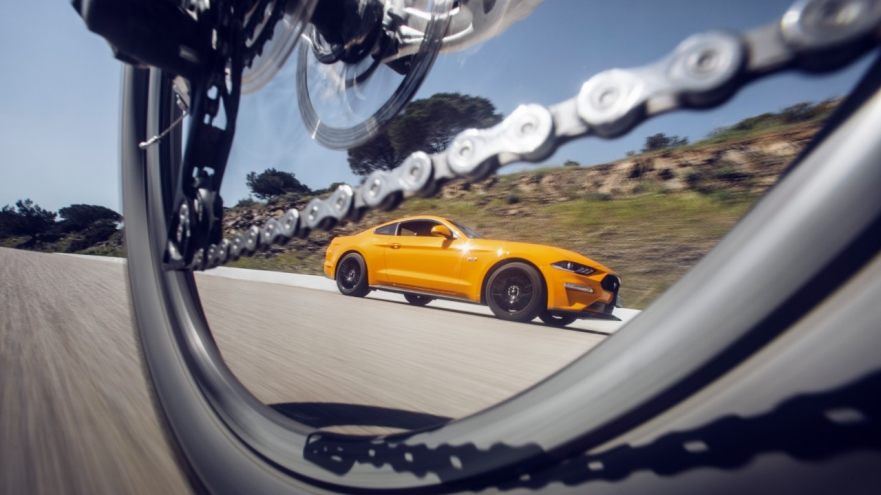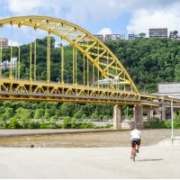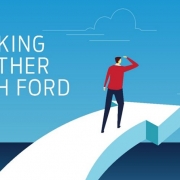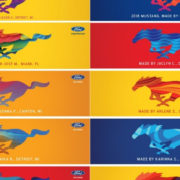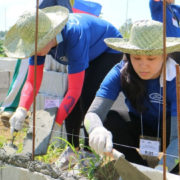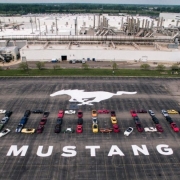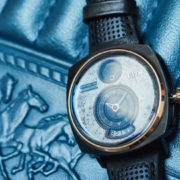FORD CALLS ON DRIVERS, CYCLISTS TO ‘SHARE THE ROAD’, VIRTUAL REALITY EXPERIENCE SHOWS HOW
- Share The Road’ promotes driver and cyclist harmony in increasingly congested cities, targeting changes in behaviour to help make urban areas safer, reduce pollution, congestion
- New ˜WheelSwap’ virtual reality experience is shown to breed empathy, defuse antagonism
- Research shows that awareness and empathy are key to changing behaviour; within two weeks of taking part, 60 percent of people, drivers and cyclists, changed their on-road habits
- Ford introduces tech that can detect cyclists in or near the driver’s road ahead and automatically brake if a collision is imminent
As increasing numbers of people get on their bikes, flashpoints between drivers and cyclists are an all-too frequent sight in Europe’s cities. And while infrastructure that keeps different road users apart struggles to keep pace, Ford is launching a new campaign designed to help improve safety and reduce pollution and congestion.
˜Share The Road’ seeks to foster harmony between road users and underlines the company’s belief that enabling more people to cycle safely, especially for short journeys, benefits everyone.
To this end, Ford has produced a groundbreaking virtual reality experience. ˜WheelSwap’ enables motorists and cyclists to see how inconsiderate driving and riding can be at the least hair-raising -and potentially fatal – for their fellow road users. Initial studies show that after undergoing the experience, nearly all participants said they would change their behaviour.
As someone who frequently travels on both two wheels and four wheels, I have experienced first ‘hand many of the frustrations – and dangers – that drivers and cyclists encounter on our roads today, said Steven Armstrong, president and CEO, Ford of Europe, Middle East & Africa. œThe safe integration of increasingly diverse modes of transportation is key to how we make our cities safer and easier for everyone to get about in, now and in the future.
In Europe there are 250 million cyclists and those on two wheels account for 1 in 12 of all road accident fatalities. With proven benefits to health, air quality and congestion, many cities are actively promoting cycling. The campaign has already won the support of Sir David Brailsford, who heads up the multi-Tour de France winning Team Sky cycle team.
œThis is a very timely initiative by Ford. Europe is home to some of the world’s largest cycling communities and the increased pressure on road space is raising safety ever higher up the agenda, said Sir David. œThis campaign is not just about introducing new technology but also highlighting the need for equal respect and responsibility. If both cyclists and motorists took a little bit more time to understand each other’s needs, we would quickly see a change in attitudes and behaviour which can ultimately improve road safety for everybody. Ford’s leadership role can play an important part in helping make that happen
Ford’s mobility strategy is to deliver a broad suite of products and services that enhance all layers of the transportation system – vehicles, infrastructure, connectivity and digital services – to help people move more freely in the City of Tomorrow. This includes pilot schemes such as a car sharing and bike sharing collaboration between Ford of Germany and Deutsche Bahn Connect GmbH, a subsidiary of Deutsche Bahn AG; the Chariot commuter shuttle services designed for city dwellers who live in harder-to-serve areas where public transport is not easily accessible; and smart benches that help pedestrians stay connected on the move with mobile charging and Wi-Fi.
˜WheelSwap’, enables motorists to see from a cyclist’s point of view how scary it can be when drivers overtake too closely, swerve without indicating and open car doors without checking for bikes. Another version enables cyclists to experience what it is like for drivers when they jump red lights, cycle down one-way streets the wrong way and swerve unexpectedly.
More than 1,200 people took part in the initial research across five European countries, with 70 per cent of those who experienced ˜WheelSwap’ displaying greater empathy to their driving and cycling counterparts after watching the film, compared with those who had not. Furthermore, 91 per cent planned to change their on ‘road habits; and just two weeks after experiencing ˜WheelSwap’, 60 per cent had changed their behaviour on their day ‘to ‘day travels.
Ford is now integrating the virtual reality experience into its free driver training program for 17 to 24-year-olds, Ford Driving Skills for Life. Nearly $20 million has been committed to Ford Driving Skills for Life in Europe through the program since 2013 for free, hands-on classes that also cover hazard recognition, vehicle handling, and speed and space management. The company is also making the ˜WheelSwap’ experiences available on YouTube along with useful tips for how to stay safe on the road.
You can find more information regarding ˜Share The Road’ here: https://www.ford.co.uk/experience-ford/about-ford/share-the-road.
œThere is no more effective means of appreciating someone else’s point of view than stepping into their shoes, or in this case, on to their pedals. Empathy is an immensely powerful emotion, said behavioural scientist Dan Berry who helped devise the experiment.
Last month, Ford launched the all-new Focus with technology that can detect cyclists in or near the road ahead, or who may cross the vehicle’s path. Pre-Collision Assist with Pedestrian and Cyclist Detection automatically applies the brakes if it detects a potential collision and the driver does not respond to warnings.

